Almost Zlatan: Ibrahimovic’s ex-teammate on a sliding doors story
Zlatan Ibrahimovic has hung up his football boots at the age of 41. But Sweden’s greatest-ever footballer could have been overshadowed if it wasn’t for one moment in 1999 when his neighbour and friend took a fateful penalty for their hometown club.
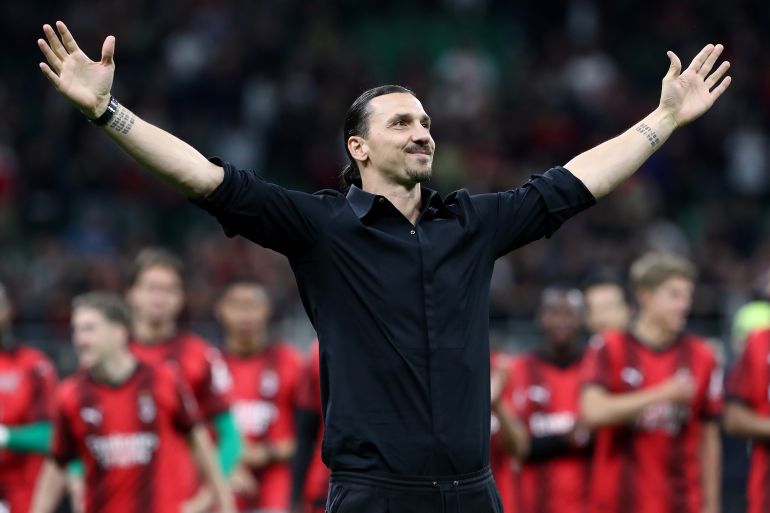
Malmö, Sweden – “Here is where Zlatan’s goal against England was created,” says Tony Flygare. “Zlatan says it is his taekwondo that made it, but I say it’s here.”
Flygare points down to a space under a shed on raised legs that forms a makeshift goalmouth. Flygare and Zlatan Ibrahimovic used to practise their trick shots here as teenagers, following their dreams of playing for Malmö FF.
Keep reading
list of 4 itemsLeBron James hits back at Zlatan in athlete activism spat
UEFA launches probe into abuse aimed at Ibrahimovic
Watching Zlatan
It’s the wettest pitch in Malmö. In fact, it’s the sea.
“This beach is like Malmö’s Copacabana,” Flygare tells Al Jazeera.
“You had the bad guys hanging out here, the girls here … and me and Zlatan and our friends down in the water with a football.”
The soft landing in the water made it an ideal place to try out overhead kicks. Just under 20 years later, Ibrahimovic was able to draw on this warm-up in the waves with a jaw-dropping strike for Sweden.
It was one of the many highlights of a glittering career that came to an end on Sunday when the 41-year-old said goodbye to AC Milan fans and teammates on the pitch at the San Siro.
Rewind 24 years, and the boy from Malmö’s tough Rosengård estate had just broken into the first team at Mälmö FF, having transferred from FBK Balkan – one of Sweden’s many immigrant-oriented teams – four years earlier.
Alongside him at Mälmö FF was Flygare, who says he was the bigger star at the time, a goal machine tipped for the top, until one moment on the pitch took the two second-generation Balkan immigrants in utterly different directions.
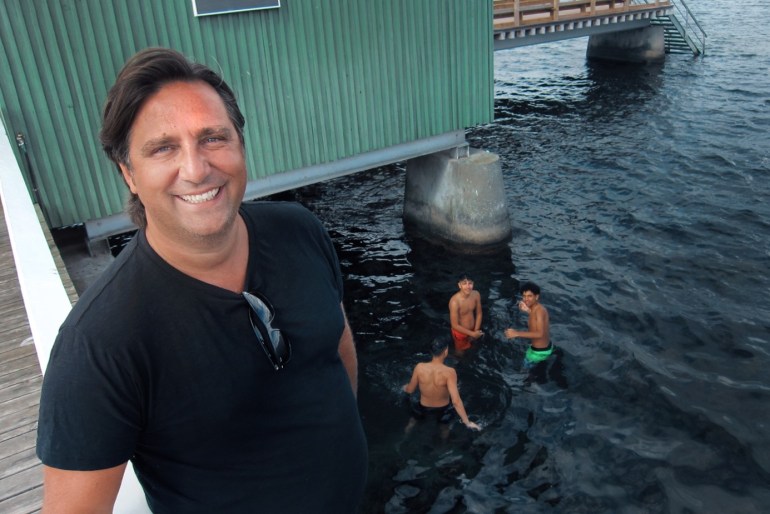
In the court of King Zlatan
Cronmans Väg is a quiet row of social housing flats, just off Amiralsgatan, the main road that splits the Rosengård estate, where Ibrahimovic grew up, and leads into the centre of Malmö.
It’s one route the teenage footballer could have taken on one of his stolen bikes to get to training at Malmö FF from his mother’s home on Cronmans Väg.
About a minute after leaving the estate, he could be at Flygare’s house. The two met as six-year-olds but became close playing up front for FKB Balkan when both were 12 or 13.
“Where I lived, it’s just 100 metres from Rosengård. But Zlatan was always baiting me,” says Flygare as he walks towards the pair’s old haunt near Ribersborg beach.
“He says, ‘You’re not from here. You’re not from Rosengård.’ And I would say, ‘Shut up, man’.
“We were crazy together. Everything was a competition. If I said something was blue, he’d say it was red. I loved English football, he loved Italian. But when we played together, it was magic.
“We’d be there on the field swearing at each other in [Balkan languages], the coaches telling us to take it easy. But then we’d start scoring goals and hugging each other, then back to mine for dinner. We were just the same.”
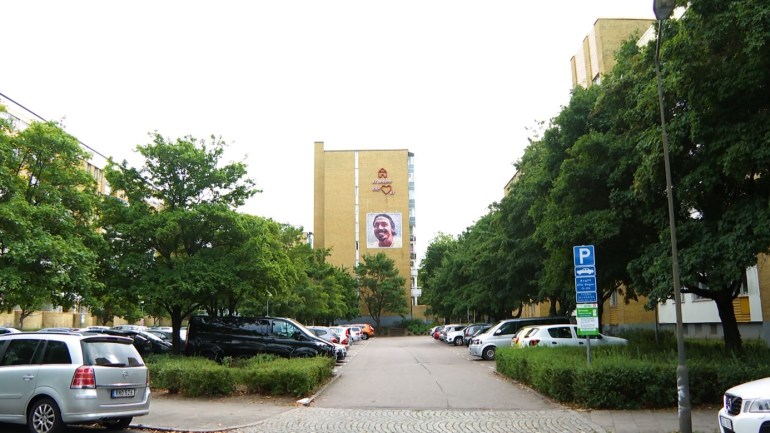
Rosengård comes up a lot in Zlatan’s autobiography, I Am Zlatan. “You can take the kid out of the ghetto, but you can’t take the ghetto out of the kid,” he says of his birthplace.
He’s a hero to many in the largely immigrant neighbourhood, an emblem for those who want to rise above what can be a humdrum or dangerous life on the fringes of Swedish society.
Hadi Hadrous, Mohamed Maayouf and Wael Ali all live in Rosengård and spoke to Al Jazeera in the courtyard behind Cronmans Väg – now featuring a football pitch called Zlatan Court.
When they were born, Ibrahimovic was winning Scudettos with Inter Milan and was a couple of years away from his 2009 move to Barcelona.
He’s perhaps the only person in their 40s who could hold their interest.
“He’s the best-known Swedish footballer in the world, and his dad lived in my courtyard. That’s insane,” says Maayouf, 15, whose family are from Iraq. “He’s a big inspiration for small children here. People want to be like him.”
“It’s sick that he’s from Rosengård and such a big star now,” says Hadrous, who like Ali has family from Palestine.
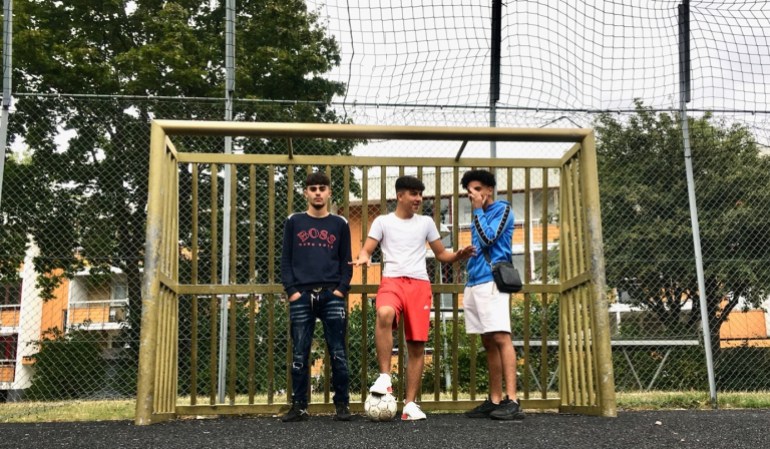
Not everyone here holds him in the same regard.
“Why are you here? Obviously because of Zlatan,” says a young man in a seating area to the side of the pitch.
“But we’re not the kind you can interview,” adds his friend.
Even so, they must like Zlatan?
“We hate him because he says he’s God. He’s a footballer, nothing more.”
“God can break his neck,” says a third in the group.
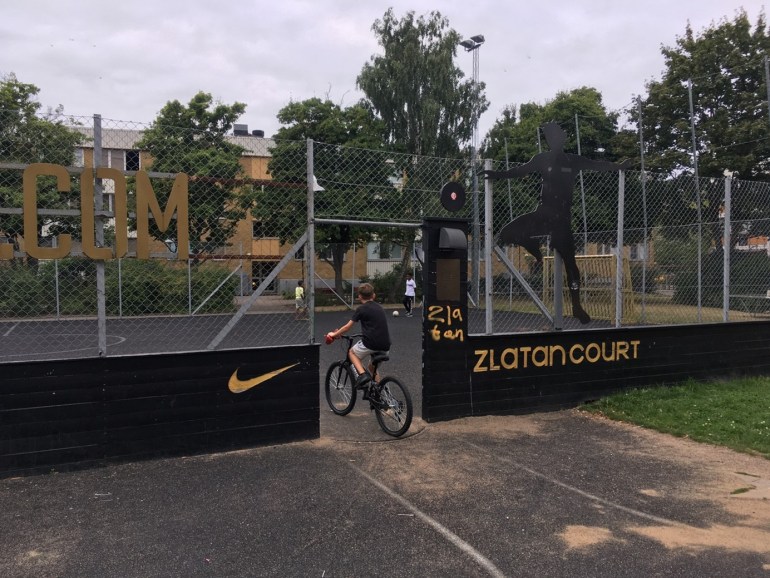
Ibrahimovic played four years for Malmö FF’s youth team and two for the first team before leaving for Ajax in 2001.
In 2019, a statue to Ibrahimovic was unveiled outside Malmö FF’s stadium – although months later it was torn down by ultras after he bought a stake in the Stockholm club Hammarby and promised to make it the best in the country – at Malmö’s expense.
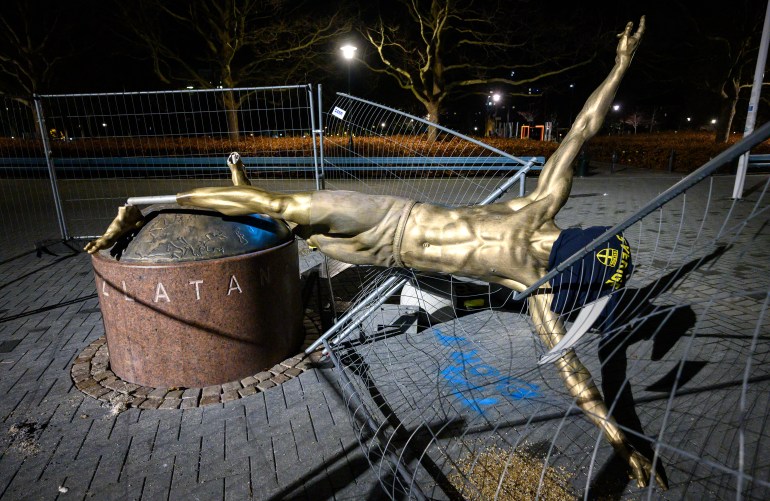
There might have been a statue of Flygare outside the stadium if things had gone differently when he and Ibrahimovic were on the pitch together for Malmö FF against Halmstad on September 19, 1999.
Just before the end of the match, Malmö were down 2-1 and on the brink of relegation from the top division for the first time in 63 years. Then the referee blew for a Malmö penalty.
Flygare, then 18, stepped forward. He missed. Malmö went down.
Ibrahimovic finished top-scorer when Malmö were promoted the next season, paving the way for his moves to the Netherlands, Italy and beyond. Flygare was frozen out and knocked around the lower leagues before becoming homeless.
Today he is a player agent, living with his wife and two children near the beach where he and Ibrahimovic trained. Flygare’s 2014 book, Once I Was Bigger Than Zlatan, told his story. But in any case, he says, it was all destiny.
“It wasn’t meant to happen for me. It was meant to happen for Zlatan,” he says.
“People say that if I had scored, I would have been the hero, all the focus would have been on me and not him.
“But if I missed that penalty so that people could see the best of Zlatan, then I would miss it 10 times out of 10. Because my friend deserved that chance and the whole of Sweden got a player they will never see again.”